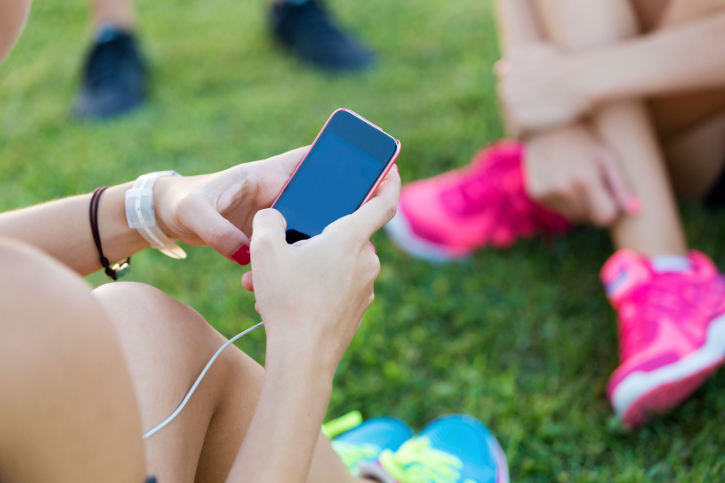 Katie Pickering has an MSc in Exercise Physiology and is conducting PhD research at Leeds Beckett University. She developed the physical activity component of the GOALS childhood & family obesity intervention; and is a winner of the Wellcome Trust & National Science Foundation competition, I’m a Scientist, Get me out of here.
Katie Pickering has an MSc in Exercise Physiology and is conducting PhD research at Leeds Beckett University. She developed the physical activity component of the GOALS childhood & family obesity intervention; and is a winner of the Wellcome Trust & National Science Foundation competition, I’m a Scientist, Get me out of here.
The Smartphone revolution is upon us with applications (apps) available to help us with pretty much any problem we have. Currently storming the market are physical activity apps that guide users through specific exercises and even full training programmes. Being able to access these Smartphone apps when it’s most convenient means that fitting physical activity into our hectic schedules is now more achievable and the cost of expensive gym memberships eradicated (with many free apps available to download).
Couch to 5K is one example of a free app that can help users to reach the recommended activity levels, (adults at least 2 and a half hours per week, children at least 60 minutes per day), outlined in the World Health Organization Europe’s new Physical Activity Strategy, which is being adopted by countries in the region today. The Couch to 5K app leads users who are new – or returning to exercise after a considerable break – through a nine-week programme consisting of walking and running for 30 minutes, 3 days each week.
The amount of time spent running is increased incrementally as the user’s fitness levels improve, and completion of the programme results in users being able to run continuously for 30 minutes and/or for a distance of 5 kilometres. Achievement and maintenance of this level of physical activity can improve health leading to a reduction in the risk of developing cardiovascular disease, diabetes, hypertension, 3 cancers, as well as improving overall mental health and wellbeing.
Effectiveness of Couch to 5K apps
Although there are many Couch to 5K apps available to download, my research focusses on the effectiveness of the Change4Life and NHS Choices version of the app. Qualitative data gathered for the research from over 900 Couch to 5K users (aged 18 or over) indicates that those who use the app are surprised by the level of physical activity they are capable of achieving upon completion of the programme, compared to their level of activity and fitness before using the app.
Users report that they like the flexibility of being in charge of when and how often they use the programme and can repeat sessions or full weeks as many times as they feel necessary before progressing.
A third of adults in European region not active enough
These findings provide useful – and much needed – data for policymakers looking for new ways to get people active – especially as WHO Europe’s Physical Activity Strategy estimates that more than one third of adults in the region do not achieve the recommended levels of physical activity; and in 46 countries (87% of in the region) more than 50% of adults are either overweight or obese.
App provides convenience & appeals to all ages
Couch to 5K fits easily into people’s daily schedules and allows for deviations in routines that timetabled exercise classes and interventions cannot accommodate. Many people in my research used statements such as “Thank you Couch to 5K you have changed my life” and now formally identify themselves as “runners”. With app users ranging in age from late teens to early 70s this truly is an app for a wide demographic of individuals looking for a cheap, accessible and guided way to lead a healthy, active lifestyle.
Tailored approach
My only caveat is that running apps may not be suitable for everyone – for example, those with conditions that do not allow ease of mobility. However physical activity is still important in these circumstances and should be performed according to how much the individual is capable of doing.
In the UK, interventions are designed to address these issues; for instance, those with limited mobility are taught how to exercise in a chair. Maintaining functional movement skills allows people to lead as independent a life as possible.
Attending exercise intervention sessions are also important for socialisation, and reducing feelings of loneliness for those confined to their homes by their health conditions.
So while running apps may not be suitable for everyone, it is becoming clear that they may be an effective way to engage those people not currently participating in physical activity. For example, younger people as they are generally more comfortable using technology and smartphones.
This is incredibly important as the World Health Organization’s figures show that globally 81% of adolescents (aged 11-17 years) are not active enough – and physical inactivity is the fourth leading cause of death. Moreover, World Cancer Research Fund International’s analysis of global research shows that there is a strong link between being physically active and a decreased link of bowel, womb and postmenopausal breast cancer.
So smartphone apps that get people moving could be effective in helping to reduce the global burden of non-communicable diseases.
To find out more about my research, email k.pickering@leedsbeckett.ac.uk or follow @C25Kresearch.
Being physically active for at least 30 minutes a day is one of World Cancer Research Fund International’s 10 Cancer Prevention Recommendations. View a 1 minute video featuring all the Recommendations. For the latest news from the organisation, please follow twitter.com/wcrfint

